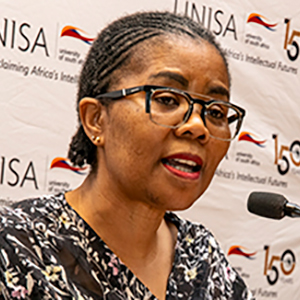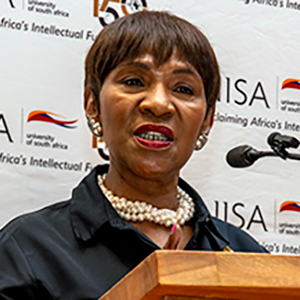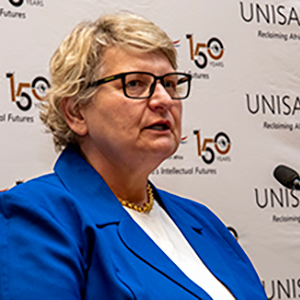News & Media
Non-alignment−a critical component for developing countries
Unisa, in partnership with the Department of International Relations and Cooperation (DIRCO), held a symposium to discuss the pros and cons of South Africa's non-alignment posture during the evolving geopolitical developments on 24 October 2023.

Prof Puleng LenkaBula
In her welcome address, Principal and Vice-Chancellor (VC), Prof Puleng LenkaBula, congratulated DIRCO for hosting the 15th annual BRICS summit in the country from 22 to 24 August 2023. "This makes us proud as a nation as we contributed to the multilateral engagements as hosts."
The VC stated that the university hosted 43 VCs from Brazil the week after the BRICS Summit as part of the university's commitment to implementing the relevant intellectual, academic and research commitments of the BRICS declaration. She continued: "Unisa continues to build strong collaborative relationships with universities in Brazil as part of South Africa's contribution to the BRICS people-to-people exchange to enhance mutual understanding and cooperation."
LenkaBula stated that the university strongly identifies with the renaissance of the African continent, espoused by the instrumental role that South Africa played in the New Partnership for Africa's Development (NEPAD) and in strengthening the African Union. She further said that the BRICS summit supports the African Union's Agenda 2063 and Africa's efforts towards integration, including through operations towards the integration of the African Continental Free Trade Area (AfCFTA).
"On 11 July 2023," said the VC, "Unisa co-hosted BRICS political parties, together with the Institute for Global Dialogue, themed There Shall be Peace and Friendship." She continued: "I am hoping that through today's engagements, this will be one of the areas that we will intensively deliberate on." The VC stated that the Non-Alignment Movement (NAM) comprised 120 countries – making it the largest multinational organisation after the United Nations. The movement strongly advocates for peace in countries currently experiencing conflict, that is, between Ukraine and Russia and Israel and Palestine. The VC expressed hope that the deliberations on these current geopolitical conflicts will give answers on the country's position as a NAM ally.
The value of the approach of independence

Ambassador Nozipho Mxakato Diseko
"As DIRCO, we are grateful for this collaboration, which provides a much-needed space for us to engage on the country's foreign policy at a critical time globally," remarked Nozipho Mxakato Diseko, Ambassador at Large for Peace and Security, Human Rights and Development. Diseko stated that from the inception of the country's democracy, the hallmark of South Africa's foreign policy has been its independence, sowed by all presidents post-1994. She continued: "It was the case by President Nelson Mandela, who hated bullying, and it has remained that way through to the current president, Cyril Ramaphosa."
This approach, she said, has enabled the country to be a bridge builder and to forge consensus breakthroughs on many critical issues globally, within the United Nations system and other international forums.
Among many of the examples she stated from this approach, Diseko remarked that President Mandela enabled the country to broker global breakthroughs, among them the indefinite extension of the Non-Proliferation Treaty (NPT) in 1995. She added, "Former President and Unisa Chancellor Dr Thabo Mbeki, made possible the World Conference on Racism, also known as Durban I, which has now become the UN's blueprint for combating racism, racial discrimination, Xenophobia and related intolerance globally." This, she stated, was immediately followed by the seminal outcomes of the world summit on sustainable development held in Johannesburg in 2002. She affirmed that these outcomes laid an essential basis for the agenda of Sustainable Development Goals 2030 with its 17 goals.
Diseko stated that South Africa has been at the Security Council three times since 1994 and has served four times on the Human Rights Council endorsed by the African Union, adding that many countries in the United Nations General Assembly voted for the country. "We are into our fifth term on the Human Rights Council," she said.
With regards to the country's non-alignment position on recent developments involving significant powers, Diseko stated that although the NAM as a formal negotiation block in the UN system has no common position on Ukraine, South Africa has consistently called for among other things, an immediate ceasefire; negotiations to ensure lasting peace in support of the UNSG's call for a return to a path of dialogue and negotiations for the protection of civilians in particular the vulnerable, women and children; unhindered humanitarian assistance; the protection of objects indispensable to the survival of the civilian population; and protection of civilians fleeing. She continued: "Nothing drives home the importance of a common vision on global peace and security everywhere, regardless of race and religion, like the horrors unfolding in Gaza as I speak, following the atrocious attack by Hamas on 7 October this year, which our government has condemned."
Closing her address, Diseko acknowledged the global demonstrations against the war unfolding between Israel and Palestine. She remarked: "Let us amplify the humanity and yearning for peace."
The search for peace must be everywhere

Prof Jo-Ansie Van Wyk
Prof Jo-Ansie Van Wyk from Unisa's Department of Political Sciences stated that questions about the country's foreign policy must be asked. She acknowledged that while South Africa is outspoken on human rights abuses, she maintained that critical questions must be asked regarding the country's non-alignment position. She added that the search for peace must be paramount; she remarked: "If we are looking for peace, we must look everywhere."
Van Wyk expressed the difficulty of holding a non-alignment position, especially when there are formidable challenges that require decisiveness. She also acknowledged the government's firm maintenance of its foreign policy governance. She stated: "Our government has consistently and over time, expressed solidarity, progressive internationalism and independence and non-alignment as four key principles to achieve the country's national interests and to be a sovereign equal state that has its rightful place among nations."
#Unisa150
* By Godfrey Madibane, Acting Journalist, Department of Institutional Advancement
Publish date: 2023/10/26

 Unisa co-hosts G20 community outreach in the Eastern Cape
Unisa co-hosts G20 community outreach in the Eastern Cape
 Unisans gain membership of prestigious science academies
Unisans gain membership of prestigious science academies
 Advocating for disability transformation through servant leadership
Advocating for disability transformation through servant leadership
 Unisa Press continues to illuminate the publishing space
Unisa Press continues to illuminate the publishing space